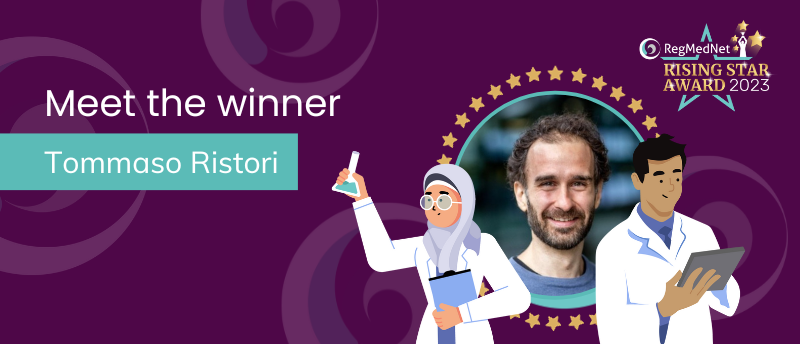RegMedNet Rising Star Award 2023: and the winner is…

We are thrilled to announce that the winner of the 2023 RegMedNet Rising Star Award is Tommaso Ristori of Eindhoven University of Technology (Netherlands)!
The Rising Star Awards honors the outstanding contribution of early-career researchers in the field of regenerative medicine. Emerging talents are nominated by colleagues and mentors and shortlisted by a panel of judges, after which a public vote decides the winner. The award recognizes rising talent and gives talented individuals a foothold in the dynamically evolving field of regenerative medicine.
Competition this year was strong and varied, with researchers grounded both in backgrounds of academia and industry. The shortlisted researchers’ topics range from the use of biomimetic bioreactors for erythropoiesis and the modeling of small blood vessels to the improvement of cell and gene therapy manufacturing platforms.
Tommaso’s research centers around the intersection of computational models and experimental setups to investigate tissue remodeling and associated cell signaling in cardiac and vascular tissues.
Hailing from a theoretical mathematics background, Tommaso transitioned into a biomedical engineering PhD. He built on his mathematical foundations to develop algorithms that predict cellular and collagen remodeling in heart valves in response to different stimuli. These algorithms have been used to support subsequent research that addresses the functionality of tissue-engineered heart valves and seeks to improve them. Such research is contributing to the optimization of tissue-engineered heart valves, which show promise as alternatives to contemporary clinical prostheses.
Tommaso investigated blood vessels during his postdoctoral research and assistant professorship. He modeled blood vessel mechanics and cell-cell signaling to identify the mechanisms underlying blood vessel homeostasis and combined experiments and simulations to examine the role of cell-cell (Notch) signaling and its relationship with Bmp9 signaling in the branching of new blood vessels from old ones. This uncovering of previously unknown relationships has given rise to several modeling research projects within his research group and also has the potential to facilitate the development of novel therapies that address arteriovenous malformations.
Tommaso’s current unpublished research is geared towards combining experiments and simulations to unravel the biological mechanisms that determine the regulation of endothelial cell-cell signaling by mechanical stimuli and using this knowledge to control the process of new blood vessel formation in time and space.
Speaking on the award, Tommaso commented:
“Being selected among the finalists of the RegMedNet Award gave a tremendous enthusiasm towards what I have accomplished so far. I was then delighted knowing that I received the most votes from the public, it confirms the relevance of my research for society and emboldens my research pursuits.”
Stay tuned for our upcoming interview with Tommaso, where we discuss his career to date, some of the challenges he has faced, the applications of his research and the advice he would give to researchers contemplating an interdisciplinary approach.
Don’t forget to: